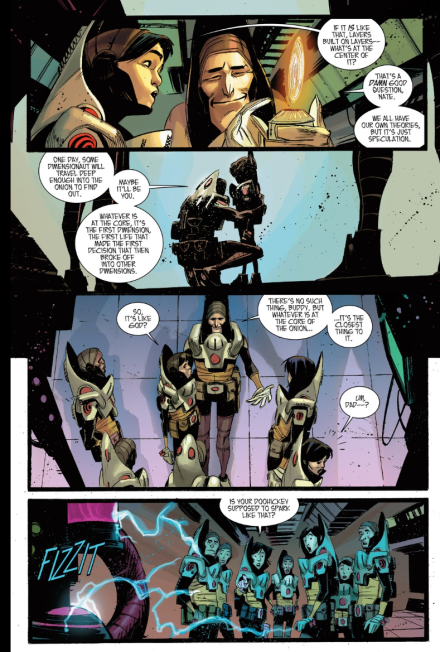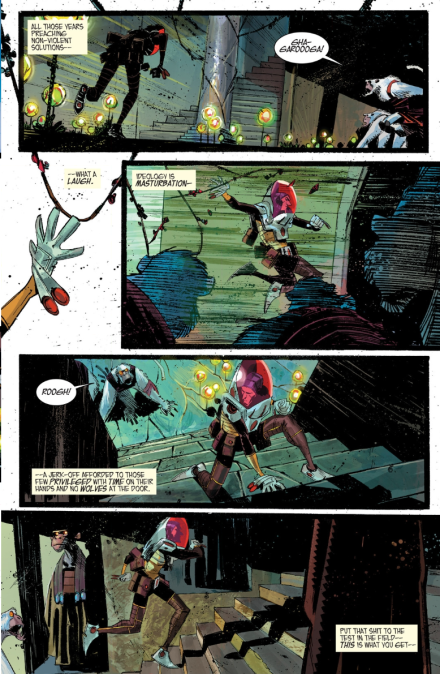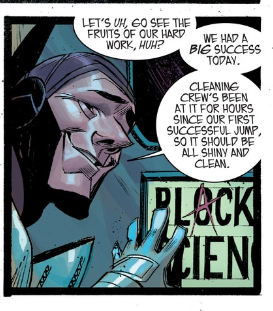The Mastodon? If memories from my boyhood serve, The Mastodon wore a garish costume, just like the rest. His was brown and yellow with a deep-vee revealing thick, red body-hair. Or was that Ultimate Man? No. Ultimate Man had the crimson cape; he could fly, too. Mastodon couldn’t fly. And the deep-vee was the middle part of an ‘M’ on his chest... so, yeah, Mastodon.
“Why do you believe that you’re the Mastodon?” I say--because you can’t argue with a delusion. Believe me; I’ve tried.
Brian sits across from me leaning forward in his chair, gripping the armrest as if he’s still bearing the weight of his confession on his back. He’s breathing heavily and I’m wondering if he will faint.
But thinking about it, he really could be. He’s huge, broad-shouldered. About the right age, late forties/early fifties. He’s pudgy around the middle, but I’d buy him as an aging superhero--metahuman, or whatever. He even has red hair.
Brian runs a shaking hand across his brow.
“Can I get a lorazepam?” he says in his husky, thick-tongued drawl.
I nod and stand, take out my keys as I cross to the cupboard. We keep this cupboard locked, of course. There’s a book where I sign for every single dose I give out: morning, noon, evening, bedtime, PRNs. Some of the guys living in this house have twenty different prescriptions or more. Most of the meds are to treat the side effects of their various antipsychotics: diabetes, high blood pressure, eczema, constipation, nausea. Mental health or physical health? I often wonder which one I could live without. It’s a hell of a choice.
And then there’s the drugs they like--like lorazepam.
I finger through the file folder of med boards, take out Brian’s lorazepam PRN--plastic bubbles on one side, foil tags on the other. I pop one into a little dixie cup with dainty pastel flowers all over it. I read somewhere that snipers take this same drug to slow their heartbeats, steady their hands for accuracy; Brian takes it every day and if he has to ride the bus, he takes a little extra.
When I give the cup to Brian, he dumps it out into his enormous hand and stares at the pill, tiny white against a field of red palm.
“You don’t believe me,” he says.
I sit down across from him with a cultivated nonchalance and take a heavy breath. You can’t argue with a delusion, but here we go.
“I have my doubts,” I tell him. “Didn’t all those guys die back in the nineties? There was, what, some kind of reality dysfunction. All the heroes and neverdowells across the multiverse came together and were destroyed in some sort of quantum cataclysm. Right?”
He’s nodding like it were just the objection he was expecting, then he makes a fist around the little pill and brings it to his mouth.
“All of them but me,” he says and swallows.
Mornings are always busy around here. By seven, the guys are filtering into my office to get their first round of meds. A lot of them need to be woken up so they can get their meds on time--they have to take them, and they have to take them at the right times; it’s part of the contract they signed to get into the halfway house program. When I go into their rooms, I always knock and make a big show of warning them that I’m coming in; but they're always just sleeping.
Back in the office, I take up my customary position behind a counter near the med cabinet. Steven comes in doing broad, sloppy boxing moves. He’s trying to get in shape, he tells me.
I begin popping pills out from a stack of boards thicker than five volumes of an encyclopedia. I have the paperwork next to me--a grid of tiny boxes for every medication on every day. I put my initials down for each pill that goes in the cup. It takes a while, so Steven jogs in place for a bit and then goes back to punching.
Russell comes and stands in the doorway. These two argue sometimes because it takes so long for Steven to get his pills and Russell has to wait. Russell eyeballs Steven for a few seconds then says, “You’re doing it all wrong.”
Steven turns and looks Russell up and down, incredulous.
This is just what I need this morning. Steven’s been spiralling out of control lately, getting more and more agitated, short-fused. He goes on these long tirades filled with violent imagery and I have to tell him to leave the house and walk around the block to cool down; but that hasn’t been working lately. I keep warning my superiors that he’s decomping--that he needs his meds adjusted or something. They just tell me to document everything.
“What do you know about it?” Steven says, puffing out his chest.
Russell shrugs. “I used to be a boxer.”
“OK,” I say and push a dixie cup full of pills across the counter.
Steven turns on me like an angry dog turning on his master.
“Don’t say that! I hate it when you say that! It sounds like you’re saying ‘Oh gay’ and I’m not gay!”
I use my fake calm voice, “I’m just telling you that your pills are ready.”
He pours the cup into his mouth, then walks over to the water cooler and fills it up.
“You’re the gay one. You’re a fucking faggot,” he says through a mouth full of pills. He drinks the water, crumples the cup and drops it on the ground.
“Go for a walk,” I tell him, trying to sound authoritative, as if there were anything I could do to compel him to obey.
He huffs and shoulders past Russell.
“What’s his problem?” Russell says, moving in to take his place in front of the counter.
“You didn’t have to provoke him.”
“I used to be a boxer,” he says, raising his voice an octave to show that he’s being defensive. “I was just trying to help.”
Russell is all matted hair, and whiskers and food stains on his clothes. He wouldn’t look at all out of place sleeping under a doorway somewhere downtown.
I get to work on his meds.
“When were you a boxer?” I say, just short of calling him a liar.
He pretends not to notice my tone.
“Oh, when I was younger. But I didn’t like it. I just can’t hurt people.”
I nod as if I agree. But I read his file. I know what he’s done. It’s not fair to judge because he was psychotic at the time. No one could seem further from that man I read about than the man standing in front of me now, though. But isn’t psychosis just that moment when the cork pops off and everything seething inside you comes spilling out?
Russell swallows his pills and says, “can I get a sharp knife?”
Staff keeps the kitchen knives in the office so the guys have to ask when they want to use one. They’re supposed to be practicing life skills, learning to be independent. This means, every now and then, they need a knife. But I still feel nervous whenever I give one out.
“I’m going to chop up some vegetables for an omelette,” Russell explains.
I retrieve the knife and hand it over. “Don’t forget to bring it back.”
“I won’t,” he says, but I know he will. I’ll most likely find it lying on the kitchen counter later this afternoon.
Everyone’s had their evening meds, and I’m waiting for my shift to end--for the night staffer to come in. The house is quiet. Brian taps on the office door.
“Can I get another lorazepam?” he says and slumps into a chair.
“OK,” I say--it does kind of sound like ‘Oh, gay.’ “What’s going on?”
Brian clears his throat. “I just been thinking about that boy.”
“What boy?”
“You know, that one that used to run around with The Dark Cowl. What was his name? Like a mouse or a bird or something. I never understood why The Cowl would put a kid in danger like that. We were supposed to be protecting kids, weren’t we?”
I raise my eyebrows as if to say, “Yep, it’s a crazy world. What are you going to do?” This is not something I want to get into right before quitting time. I move to the med cabinet to get his pill.
“You ever pick something up,” Brian continues, “and hold it in your hand and think, ‘this thing is very important. Too important for me. I’ll just mess it up.’ So you put it down?”
“Um,” I say, flipping through med boards. I have no idea what he’s talking about.
“On that day when they all died and I didn’t,” he goes on, lowering his voice like he’s talking in church, “I tried to talk the boy out of going with them for the final battle. I told him someone had to stay behind just in case. He said, ‘you do it, then.’ So I did. He was only fourteen and he died with the rest of them.”
I pop the pill into a cup and when I look up, Steven’s standing there in the doorway; his eyes are wild and shining. Brian gets up and rushes toward him. Then I see the knife in Steven’s hand--I never did find it, did I.
Brian is reaching out like he’s going to grab Steven. Steven brings up the blade and Brian folds over it, collapses, holding his stomach, curled up on the floor. Steven looks at me. Hate and vengeance all over his face. He’s rubbing the front of his pants. I can see an erection bulging there and I’m paralyzed.
“Fucking faggot,” he says and takes a step toward me.
I put my hands out in front of me. “Steven--” I begin to say, but he slaps me in the face so hard I jerk to one side, and see white sparks popping in the periphery of my vision.
“Bitch! Faggot!”
And then Russell’s in the doorway and his fists are up by his chin and he cocks back and he let’s fly. The blow connects with Steven’s brow and he reels backward and falls onto the ground.
I grab for the phone and pound out 9-1-1. I’m screaming at the dispatcher. Out of the corner of my eye, I see Steven getting to his feet. Russell’s fists are up again, but Steven ducks by him and out into the hall. I hear the front door open and slam shut.
“Lock the doors!” I scream, and Russell rushes to obey.
The dispatcher is all assurances of an ambulance and patrol cars. I drop the phone--no, I throw it down without bothering to hang it up.
Brian rolls over a bit and I can hear him crying softly. I kneel beside him. Blood is pooling on the carpet so I take my shirt off and try to bunch it up around the blade still wedged in his belly. His eyelids sag and when he speaks his voice is even thicker than usual.
“You look just like him. The boy. About the same age, right? Would have been fourteen at the time, right?”
I nod. “Yeah. You saved me.”
Next: The Last Request 06.05.2015

























